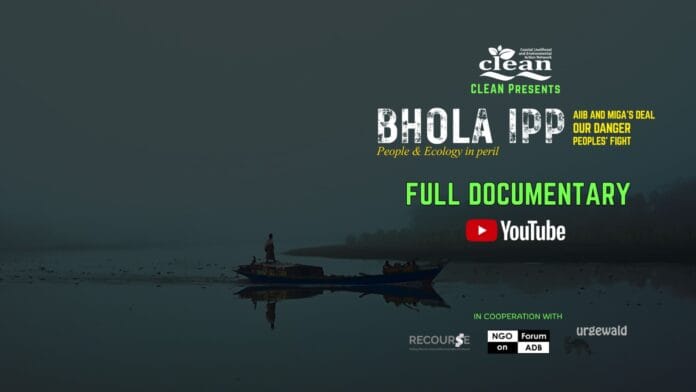A new documentary titled “Bhola IPP: People & Ecology in Peril” was launched online today, bringing to light the alarming environmental and social consequences of the 220 MW gas-fired power plant in Bhola, Bangladesh.
The film, presented by Coastal Livelihood and Environmental Action Network (CLEAN) in partnership with Recourse (UK), NGO Forum on ADB (Manila), and Urgewald (Germany), accuses major international financial institutions of enabling ecological destruction in the name of development.
The Bhola project, supported by a US$407 million guarantee from the Multilateral Investment Guarantee Agency (MIGA) and significant investments from the Asian Infrastructure Investment Bank (AIIB), has sparked serious concerns from both local communities and international watchdogs.
The documentary details how hot water discharged into the Dehula Khal is killing vital microorganisms, threatening the local aquatic ecosystem and the livelihoods of hundreds of fishers. Residents have reported the loss of fertile land, declining fish populations, and rising health risks due to chemical emissions and thermal pollution.
“This project promised prosperity but delivered pollution, displacement, and debt,” said Hasan Mehedi, Chief Executive of CLEAN. “Hot water from the plant is already killing microorganisms in the Dehula Khal, which threatens the entire aquatic ecosystem.”
The film includes testimonies from affected community members and environmental advocates, calling out financiers for failing to enforce safeguards.
Petra Kjell Wright from Recourse commented, “This isn’t just about Bhola—it’s a global warning. Institutions like AIIB and MIGA must be held accountable for funding destructive fossil gas projects. They should invest in clean renewable energy instead.”
Rayyan Hasan, Executive Director of NGO Forum on ADB, added, “AIIB failed to address the project’s negative impacts. Local communities are living with the consequences of environmental degradation and health risks. The fight for justice and accountability must continue.”
The documentary also highlights failures in project oversight and environmental assessments, calling for urgent reforms in how international financial institutions (IFIs) evaluate and monitor large-scale infrastructure projects.
“Today, we shattered the silence,” said Mehedi in closing. “This film is more than a story—it is a bold call to demand justice, defend communities, and fight for our climate before it’s too late.”
The documentary is now available online and is being shared with policymakers, development institutions, and civil society groups worldwide.

